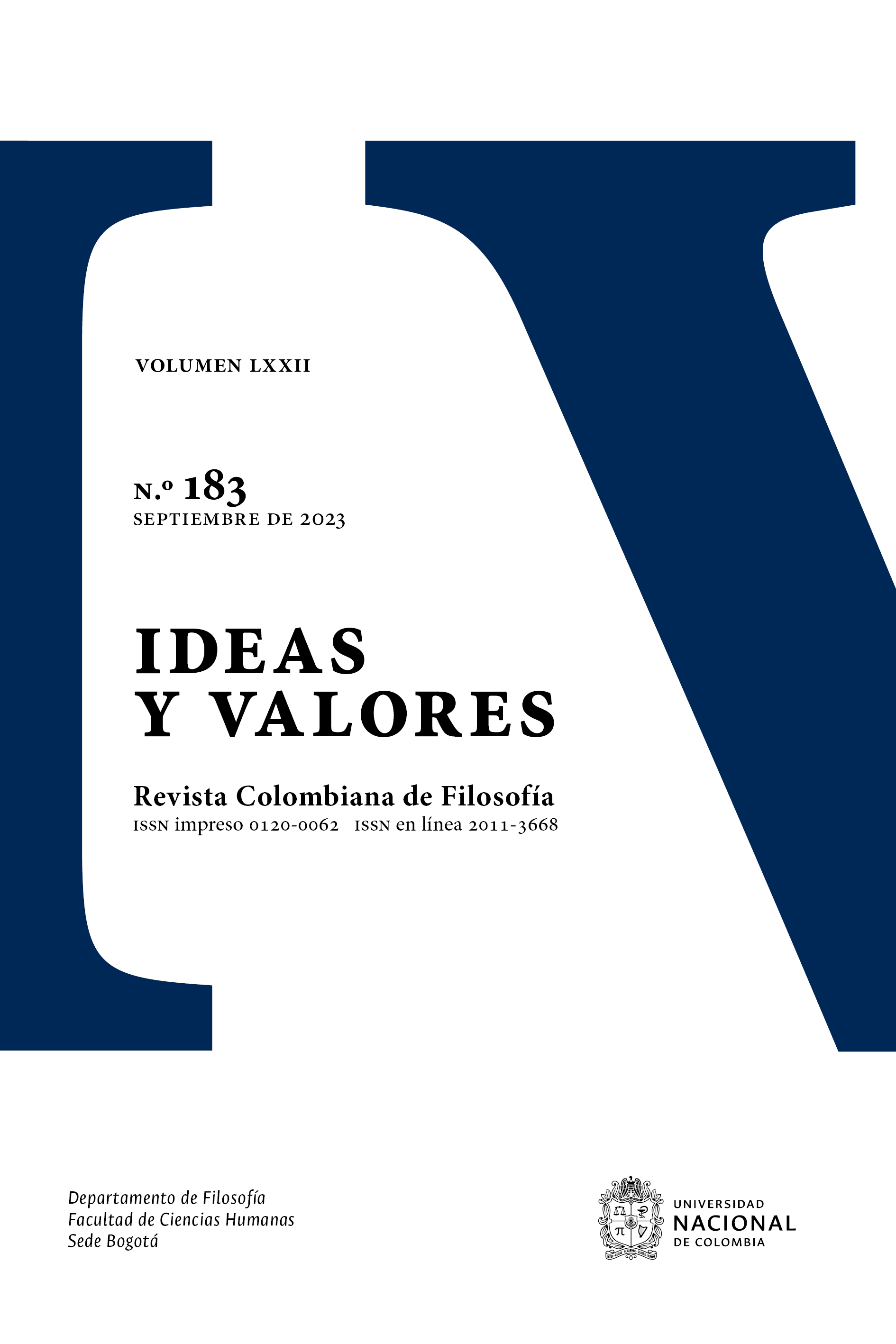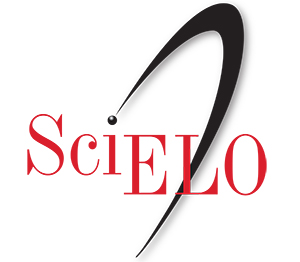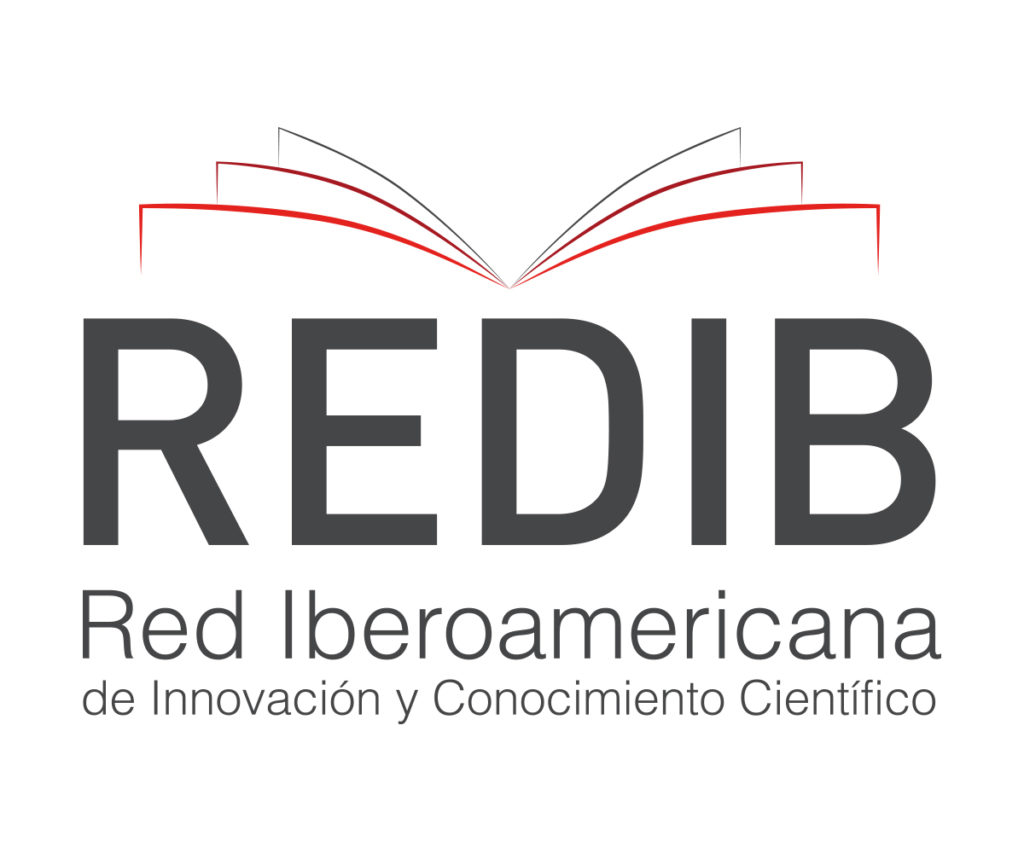Las definiciones estéticas de arte y sus supuestos
Aesthetic definitions of art and their assumptions
DOI:
https://doi.org/10.15446/ideasyvalores.v72n183.94752Palabras clave:
Danto, Dutton, Definición de arte, Estética, Experiencia estética (es)definition of art, aesthetics, aesthetic experience, Danto, Dutton (en)
Descargas
En este texto se presenta una lectura crítica de las definiciones de arte que lo vinculan de modo necesario con las propiedades estéticas. Se analizan los elementos centrales de los que dependen estas definiciones y se muestra su carácter problemático. Asimismo, se hace patente su vinculación con algunos intentos de ofrecer un enfoque intercultural y universalista de las artes y se concluye que, si bien las propiedades estéticas tienen una gran importancia en la teorización sobre las artes, es necesario tomarlas no tanto como elementos esenciales cuanto como propiedades en sentido aristotélico.
This text provides a critical reading of the definitions of art that make a necessary link between art and aesthetic properties. The central elements on which these definitions depend are discussed and the problematic character of these concepts is shown. Furthermore, their connection with some attempts to offer an intercultural and cross-cultural approach to the arts is made evident. We conclude that, although aesthetic properties are of great importance in the theorization on the arts, we must take them not so much as essential elements but as properties in the Aristotelian sense of the term.
Referencias
Anderson, James. “Aesthetic Concepts of Art.” Theories of Art Today. Edited by Noël Carroll. Wisconsin: The University of Wisconsin Press, 2000. 65-92.
Bach, Johann Sebastian, Sämtliche Orgelwerke. Band 7: Orgelbüchlein, 18 grosse Choralarbeitungen. Wiesbaden: Breitkopf und Härtel, 1991.
Beardsley, Monroe C. “An Aesthetic Definition of Art.” Aesthetics and the Philosophy of Art. The Analytic Tradition. An Anthology. Edited by Peter Lamarque and Stein Haugom Wiley Blackwell. Hoboken, NJ: Wiley Blackwell, 2019. 22-29.
Beardsley, Monroe. C. Aesthetics: Problems in the Philosophy of Criticism. New York: Harcourt Brace, 1958.
Beardsley, Monroe C. “The Aesthetic Point of View.” Metaphilosophy, 1.1 (1970): 39-58. [https://doi.org/10.1111/j.1467-9973.1970.tb00784.x]
Bullough, Edward. “Psychical Distance as a Factor in Art and an Aesthetic Principle.” British Journal of Psychology, 5 (1912): 87-117. [https://doi.org/10.1111/j.2044-8295.1912.tb00057.x]
Carroll, Noël. “Art and the Domain of Aesthetic.” British Journal of Aesthetics, 40.2 (2000): 191-208. [https://doi.org/10.1093/bjaesthetics/40.2.191]
Carroll, Nöel. “Beauty and the Genealogy of Art Theory.” Beyond Aesthetics. Cambridge: Cambridge University Press, 2001a. 20-41. [https://doi.org/10.1017/CBO9780511605970.004]
Carroll, Nöel. “Enjoyment, Indifference and Aesthetic Experience: comments for Robert Stecker.” British Journal of Aesthetics, 41.1 (2001b): 81-83. [https://doi.org/10.1093/bjaesthetics/41.1.81]
Carroll, Nöel. “Four Concepts of Aesthetic Experience.” Beyond Aesthetics. Philosophical Essays. Cambridge: Cambridge University Press, 2001c. 41-62. [https://doi.org/10.1017/CBO9780511605970.005]
Carroll, Nöel. “Aesthetic Experience Revisited”. British Journal of Aesthetics, 42.2 (2002): 145-168. [https://doi.org/10.1093/bjaesthetics/42.2.145]
Castro, Sixto J. Vituperio de orbanejas. México: Herder, 2005.
Castro, Sixto J. “El arte ya (no) es bello.” Sociedades en crisis, perspectivas estéticas para Europa. Madrid: Ministerio de Cultura, 2011. 136-145.
Castro, Sixto J., “¿Qué significa apreciar la ‘naturaleza’ como naturaleza?”. Revista de Filosofía, 40.2 (2015):127-141. [https://doi.org/10.5209/rev_RESF.2015.v40.n2.50059]
Castro, Sixto J. Filosofía del arte. El arte pensado. México: Herder, 2017.
Danto, Arthur C. The Philosophical Disenfranchisement of Art. New York: Columbia University Press, 1986. DOI: https://doi.org/10.2307/25006747
Danto, Arthur C. La transfiguración del lugar común. Traducido por Ángel Molla y Aurora Molla. Barcelona: Paidós, 2002.
Danto, Arthur C. Más allá de la Caja Brillo. Las artes visuales en perspectiva post-histórica. Traducido por Alfredo Brotons. Madrid: Akal, 2003.
Danto, Arthur C., Después del fin del arte. El arte contemporáneo y el linde de la historia. Traducido por Elena Neerman. Barcelona: Paidós, 2010.
Danto, Arthur C. El abuso de la belleza. Traducido por Carles Roche. Barcelona: Paidós, 2011.
Davies, Stephen. “Non-Western Art and Art’s Definition.” Theories of Art Today. Edited by Noël Carroll. Wisconsin: The University of Wisconsin Press, 2000. 199-216.
Dhillon, Pradeep A. “A Kantian Approach to Writing a Global Art History.” The Many Faces of Beauty. Edited by Vittorio Hösle. Notre Dame: University of Notre Dame Press, 2013. 302-326.
Dickie, George. “The Myth of Aesthetic Attitude”. American Philosophical Quarterly 1 (1964): 56-65.
Dickie, George. “Beardsley’s Phantom Aesthetic Experience.” Journal of Philosophy, 62 (1965): 129-136. [https://doi.org/10.2307/2023490]
Dickie, George. “Physical Distance: In a Fog at Sea.” British Journal of Aesthetics, 13 (1973): 17-29. [https://doi.org/10.1093/bjaesthetics/13.1.17]
Dickie, George. Art and the Aesthetic: An Institutional Analysis. Ithaca, NY: Cornell University Press, 1974.
Dickie, George. El círculo del arte. Una teoría del arte. Traducido por Sixto J. Castro. Barcelona: Paidós, 2005.
Dickie, George. “Altamira y la invención de la representación visual.” Estudios Filosóficos, 161 (2007): 5-16.
Dutton, Denis. “Tribal Art and Artifact.” Journal of Aesthetics and Art Criticism, 51 (1993): 13-21. [https://doi.org/10.2307/431966]
Dutton, Denis. “Art, Behavior and the Anthropologists.” Current Anthropology, 18 (1997): 387-394. [https://doi.org/10.1086/201921]
Dutton, D. El instinto del arte. Belleza, placer y evolución humana. Traducido por Carme Font. Barcelona: Paidós, 2010.
Eaton, Marcia. M. “A Sustainable Definition of Art.” Theories of Art Today. Edited by Noël Carroll. Wisconsin: The University of Wisconsin Press, 2000. 141-159.
Friday, Jonathan. Aesthetics and Photography. Aldershot: Ashgate, 2002.
Ground, Ian. ¿Arte o chorrada? Traducido por Salvador Rubio. Valencia: Universidad de Valencia, 2008.
Iseminger, Gary. “The Aesthetic State of Mind.” Contemporary Debates in Aesthetics and the Philosophy of Art. Edited by M. Kieran. Malden, MA: Blackwell, 2006. 98-112.
Kant, Immanuel. Crítica del juicio. Traducido por Manuel García Morente. Madrid: Espasa, 1995.
Kristeller, Paul O. “The Modern System of the Arts: A Study in the History of Aesthetics Part I”. Journal of the History of Ideas, 12. 4 (1951): 496-527. [https://doi.org/10.2307/2707484]
Kristeller, Paul O. “The Modern System of the Arts: A Study in the History of Aesthetics (II).” Journal of the History of Ideas, 13.1 (1952): 17-46. [https://doi.org/10.2307/2707724]
Lamarque, Peter. “Aesthetic Essentialism.” Aesthetic concepts: Essays after Sibley. Edited by E. Brady and J. Levinson. Oxford: Clarendon Press, 2001. 100-122.
Lessing, Gotthold E., Laocoonte. Traducido por Sixto J. Castro. México: Herder, 2014.
Lind, Richard. “The Aesthetic Essence of Art.” Journal of Aesthetics and Art Criticism, 50 (1992): 117-129. [https://doi.org/10.2307/430951] .
Margolis, Joseph. “Works of Art as Physically Embodied and Culturally Emergent Entities.” British Journal of Aesthetics, 14. 3 (1974): 187-196. [https://doi.org/10.1093/bjaesthetics/14.3.187]
Margolis, Joseph. On Aesthetics. An Unforgiving introduction.Belmont, Ca: Wadsworth, 2009.
Matravers, Derek. “The Aesthetic Experience.” The Continuum Companion to Aesthetics. Edited by Anna C. Ribeiro. London-New York: Continuum, 2012.
Schaeffer, Jean-Marie. Beyond Speculation. Art and Speculation without Myths. Translate by Dafydd Roberts. Chicago: Seagull Book, 2015.
Scharfstein, Ben Ami. Art without Borders. A Philosophical Exploration of Art and Humanity. Chicago: The University of Chicago Press, 2009. [https://doi.org/10.7208/chicago/9780226736112.001.0001]
Schlesinger, George. “Aesthetic Experience and the Definition of Art.” British Journal of Aesthetics 19 (1979): 167-176. [https://doi.org/10.1093/bjaesthetics/19.2.167]
Scruton, Roger. Beauty. Oxford: Oxford University Press, 2009. [https://doi.org/10.1093/actrade/9780199229758.001.0001]
Sibley, Frank. “Aesthetic Concepts.” Approach to Aesthetics: Collected Papers on Philosophical Aesthetics. Oxford: Oxford University Press, 2001. 1-23. [https://doi.org/10.1093/0198238991.003.0001]
Tomás de Aquino, In librum beati Dionysii De divinis nominibus expositio. Turín: Marietti, 1950. [https://www.corpusthomisticum.org/cdn04.html]
Walton, Kendall. “Categories of Art.” The Philosophical Review, 79.3 (1970): 334-376. [https://doi.org/10.2307/2183933]
Walton, Kendall. “How Marvelous! Toward a Theory of Aesthetic Value.” Journal of Aesthetics and Art criticism, 51 (1993): 499-510. [https://doi.org/10.1111/1540_6245.jaac51.3.0499]
Wollheim, Richard. El arte y sus objetos. Traducido por Carlos Trías. Barcelona: Seix Barral, 1972.
Zangwill, Nick. “The Creative Theory of Art.” American Philosophical Quarterly, 32 (1995): 307-323.
Cómo citar
MODERN-LANGUAGE-ASSOCIATION
ACM
ACS
APA
ABNT
Chicago
Harvard
IEEE
Turabian
Vancouver
Descargar cita
Licencia
Derechos de autor 2021 Los derechos son del autor(es), quien(es) puede re-publicar en parte o en su totalidad el documento ya publicado en la revista siempre y cuando se dé el debido reconocimiento a Ideas y Valores

Esta obra está bajo una licencia internacional Creative Commons Atribución-NoComercial-SinDerivadas 4.0.
De acuerdo con la Licencia Creative Commons Atribución-No Comercial-SinDerivar 4.0 Internacional. Se autoriza copiar, redistribuir el material en cualquier medio o formato, siempre y cuando se conceda el crédito a los autores de los textos y a Ideas y Valores como fuente de publicación original. No se permite el uso comercial de copia o distribución de contenidos, así como tampoco la adaptación, derivación o transformación alguna de estos sin la autorización previa de los autores y de la dirección de Ideas y Valores. Para mayor información sobre los términos de esta licencia puede consultar: http://creativecommons.org/licenses/by-nc-nd/4.0/legalcode.















.jpg)











